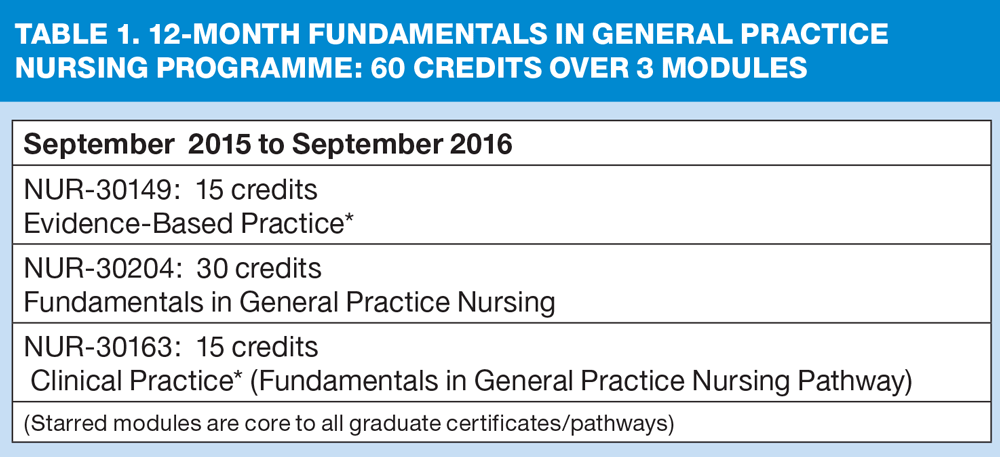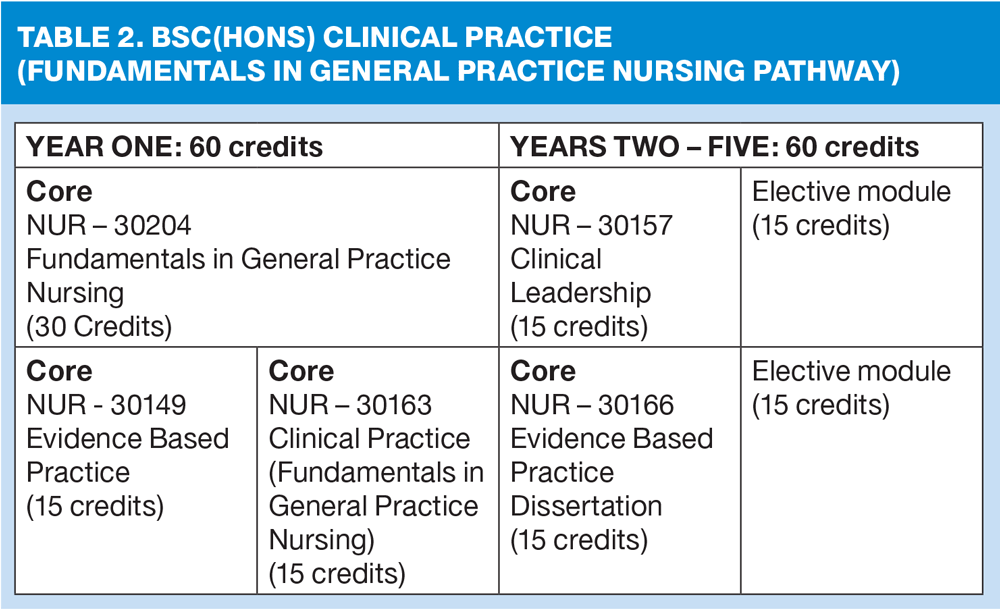Taking an academic approach to training our new GPNs
Dr Andrew Finney
Dr Andrew Finney
RGN, BSc (Hons) PhD
Lecturer and Programme Lead for Fundamentals in General Practice Nursing
School of Nursing and Midwifery, Keele University
Dawn Johnson
RGN, MSc
Senior Lecturer and Head of Continuing Professional Development
School of Nursing and Midwifery, Keele University
Karen Storey
RGN MSc
Primary Care Lead Nurse-Workforce
Health Education West Midlands
St Chads, Birmingham
Anna Lynall
Project Manager
Health Education West Midlands
St Chads, Birmingham
Keele University is among a number of higher education institutes developing a ‘Fundamentals in General Practice Nursing’ degree course to ensure that the next generation of GPNs are ‘fit for purpose’
The NHS England business plan ‘Putting Patients First’, the Royal College of General Practitioners’ ‘The 2022 GP – a vision for primary care in the future NHS’, along with the NHS ‘Five Year Forward View’ all subscribe to a more integrated community-shaped, generalist healthcare service with diverse, skilled, generalist trained professionals.1-3
In order to meet these challenges, the capacity and capability of the primary care workforce must be developed, and in particular those of the general practice nurse (GPN). However, most of these skills are not part of pre-registration nurse training, nor are they found in nurses working in other settings, and yet to date there has been no mandatory education for GPNs.
While there is a GPN competency framework aligned to the Knowledge and Skills Framework, there are no specific national descriptions of practice nursing roles; instead they are usually shaped by the practice and the areas they serve. As part of the Transforming Nursing for Community and Primary Care Programme, chaired by the Chief Nursing Officer for NHS England, a career framework was developed. Following on from this an education specification was developed to offer strategic advice and national requirements to local education and training boards for commissioning education to support the development of primary and community nursing in order to ensure equality and consistency across England. One strand of this was to develop a new academic programme of training for new and junior GPNs.
There has been variable academic preparation and training for GPNs and in many areas there has been limited mentorship and support made available for nurses who have transferred from secondary to primary care settings. In order to ensure that new GPNs are both fit for practice and fit for purpose within new working structures it is vital to recognise the need for a structured and standardised training approach.
FUNDING
In 2014 Health Education England West Midlands (HEEWM) identified funding to develop a ‘Fundamentals in General Practice Nursing’ (FGPN) programme based on the developing national career framework and educational commissioning service specification. Scoping of programmes that were already running in the UK identified De Montfort University whose course was based on the Plymouth University model. Through the development of a working group all higher education institutions (HEIs) in the West Midlands were invited to participate in developing a pilot programme. Birmingham City, Worcester (pilot sites), Staffordshire and Keele University all developed programmes for 2015. Following successful evaluations of the pilot programmes, HEWM has commissioned 84 places across six HEIs in the West Midlands for 2016-17.
THE KEELE UNIVERSITY PROGRAMME
The brief from HEEWM was to develop a programme to support GPNs to acquire the required skills and knowledge in their first year in general practice:
- Delivery duration – no less than 6 months and no longer than 18 months
- Delivered with a range of teaching, learning and assessment methods suitable to meet the needs of the learners
- Work based learning to be delivered, supported and assessed by appropriate educational and clinical professionals
- Ensure the contribution of local expertise to the programme where practical
- Provision of mentorship training and on-going support for assessors
Another proviso was that the programme should offer the option to acquire 60 credits at a minimum of degree level, with students having the option to gain a graduate certificate or equivalent.
The scope of competencies required by HEEWM was aligned to the RCGP’s General Practice Nurse competencies.*4 A meeting was arranged between the Head of Continuing Professional Development, other school representatives and practice nursing leaders within the local Clinical Commissioning Group (CCG) to discuss priorities and requirements for a fundamental practice nursing programme further, to ensure a partnership approach was embedded into the process of development.
A scoping exercise of other similar existing programmes was undertaken, and it was quickly decided that the development of a 60-credit graduate certificate (Level 6) was the best way to fulfil the brief. Furthermore, Keele currently provides a successful graduate certificate in critical care nursing, leading to a conversion degree, thus it seemed logical to adopt this existing model and adapt it to FGPN. Regarding timescale, as Keele already provided a full-time 120-credit specialist practice programmes over a 12-month period with two days a week attendance, it was agreed that a 12-month 60-credit programme with an average one day per week was achievable.
This 60-credit approach enabled the FGPN programme to fit as a pathway within the School’s post-registration conversion degree, BSc (Hons) Clinical Practice,5 designed for health practitioners who have an undergraduate diploma or equivalent, and wish to convert this to an undergraduate degree by adding a further 120 credits, studied at level 6. Conversion to a full degree is thus an option for students achieving the FGPN 60-credit graduate certificate, by the addition of a further 60 level 6 credits, which could be achieved part-time in up to a further four years.
The Course Administrative Team and the nominated Award Lead for the programme were responsible for recruitment to the programme, working in close partnership with practice nursing leaders within the local CCG.
FGPN 2015-16 - BARRIERS TO RECRUITMENT
Keele had ten commissioned, fully-funded places available for their first cohort of the programme. However, there were barriers to recruitment. General practices and practice managers were keen to recognise the need to train and up-skill their GPN workforce but were initially reluctant to release GPNs for the required one day per week and for the 12-month duration of the course. Older models of training where GPNs undertook mandatory skills training as part of a short course (12 weeks) were generally favoured. Of the ten available places eight GPNs were enrolled onto the programme. All of the students enrolled were within one year of starting in post as a GPN (a course requirement). It was evident that due to the lack of a consistent training approach across practices and the varying times that each student had been in post, that they had each received a different level of support and training.
’The fundamentals in general practice nursing pathway has not only underpinned and developed my clinical practice and knowledge, but enabled me to engage with other practice nurses who can share best evidence’ – Georgina Challinor, FGPN student, 23
Within the Keele programme all students undertake an evidence-based practice module which equips them with the skills to identify areas of clinical variation or uncertainty, it teaches them to search for best evidence, to appraise it for its validity and reliability, and where possible, how to apply it.6 Alongside this the students undertake a work-based learning module entitled ‘Clinical Practice’. The module aims to facilitate students’ critical application of theory to practice within their own area of work. This aims to enable students to enhance patient-centred practice through their critical application of evidence, enhanced knowledge and understanding within their workplace. As part of the module students are assigned a mentor in their workplace who supports them to achieve nursing competencies mapped to those of the RCGP framework.
’The Fundamentals in General Practice Nursing Course has definitely been the stepping stone for my future in primary care’ – Rajvinder ‘Raj’ Chatha, FGPN student, 27
Finally as part of the FGPN module students are offered nationally accredited courses in cervical cytology for sample takers, spirometry, vaccinations and immunisations, ear care and travel health. Further theoretical training is provided by nurse specialists for many of the most common long-term conditions. The course also explores key aspects of emergency care, care of the patient with mental health needs, public health, health promotion, sexual health, women’s health, men’s health, wound care, communication skills, safeguarding and law and ethics. An additional feature of the Keele programme is the opportunity for the students to visit the universities anatomy suite to enable them to see the impact of key long-term conditions and other related health problems on the human body.
‘Doing the FGPN programme hasn’t just given me a great support network; it has improved my skills and knowledge base in general practice’ – Andrew Lomas-Gee, FGPN student, 45
Assessment within the programme is undertaken using a variety of methods: students are assessed in practice; complete three written assignments; deliver a seminar presentation and undertake a consultation-styled oral exam. The first cohort of the Keele programme complete their studies in September 2016, with funding in place for cohort two to commence in September 2017. With new funding proposed for primary care and GPN training at its focus,7 we hope that programmes such as this will help both the recruitment and retention of junior GPNs and support the progression of a career in practice nursing – instilling confidence in essential knowledge and skills, and insight into future professional development – and contribute to the quality of care given to patients.
*Practice Nurse’s CPD Curriculum is based on the competencies identified in the RCGP’s General Practice Nurse Competencies framework. Click on the CURRICULUM tab above to see what's on offer
REFERENCES
1. NHS England Putting Patients First: The NHS England Business Plan for 2013/14 – 2015/16. http://www.england.nhs.uk/wp-content/uploads/2013/04/ppf-1314-1516.pdf
2. Royal College of General Practitioners. The 2022 GP: A vision for Primary Care in the future NHS, 2012 http://www.rcgp.org.uk/policy/rcgp-policy-areas/~/media/Files/Policy/A-Z-policy/The-2022-GP-A-Vision-for-General-Practice-in-the-Future-NHS.ashx
3. NHS England. The NHS Five Year Forward View, 2014. https://www.england.nhs.uk/wp-content/uploads/2014/10/5yfv-web.pdf accessed 27.04.2016
4. Royal College of General Practitioners General Practice Foundation General Practice Nurse Competencies. London: RCGP; 2012
5. School of Nursing and Midwifery, Keele. BSc (Hons) Clinical Practice, 2016 http://www.keele.ac.uk/nursingandmidwifery/cpd/postreg/bsc-clin-prac/
6. Finney A, Johnson K, Edwards J, et al. Critically Appraised Topic (CATs): A method of integrating best evidence into general practice nursing. Practice Nurse, March 2016;46(3):32-34
7. NHS England. General Practice Forward View, 2016. https://www.england.nhs.uk/wp-content/uploads/2016/04/gpfv.pdf

